Letter from John Durbin to John Zug

Dickinson College President John P. Durbin writes John Zug (Class of 1837) and appoints him as the principal of the Dickinson College Grammar School until the Board of Trustees meeting in July.


Dickinson College President John P. Durbin writes John Zug (Class of 1837) and appoints him as the principal of the Dickinson College Grammar School until the Board of Trustees meeting in July.

Former Dickinson College President John P. Durbin writes to a committee, which consists of Daniel Gans, William M. Hall, and Charles Black, and thanks them for "the honor" of electing him into their society.
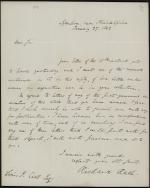
Richard Rush responds to a request for his autograph as well as any letters he may have from past governors or senators from Pennsylvania for possible publication.

President James Buchanan writes to W.C.N.

US Minister to the United Kingdom James Buchanan thanks Sir William Molesworth for his speech on "Naval Prizes." While "the agreement is unanswerable," Buchanan tells Molesworth that he "presented more historical information on the subject, in a c
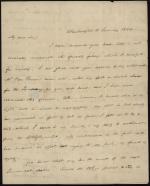
US Senator James Buchanan writes to South Carolina politician Francis Wilkinson Pickens about political issues related to the 1844 Presidential election.
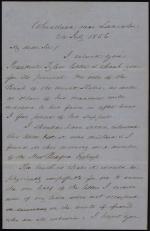
Democratic Presidential candidate James Buchanan (Class of 1803) writes John S. Cunningham about various political issues, including his support of President John Tyler's veto of the Bank of the United States in 1841.
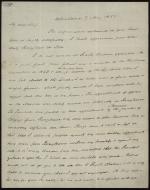
James Buchanan writes Robert Tyler, son of President John Tyler, about Buchanan's tenure as secretary of state under President James Polk and the Mexican War.
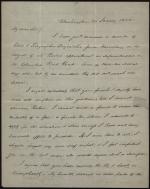
Pennsylvania politician James Buchanan congratulates James Campbell on his recent political victory and discusses W. Baker's appointment as superintendent of the Columbia Rail Road.

US Senator James Buchanan writes to Arnold Plumer about his Texas speech, a "Judge Cahon Nashville," and a letter that James K. Polk wrote to John K. Kane in June 1844. Buchanan also discuses the Tariff of 1842 and the Whigs in Pennsylvania.

James Buchanan writes to Sir Edward Curt and conveys his regrets that he cannot attend Her Majesty's Ball because he has "been unwell for the last two or three days." Buchanan is the Minister to Great Britain during President Franklin Pierce's adm

President James Buchanan responds to John A. Wilstach's letter about domestic issues and foreign affairs.
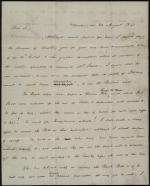
Senator James Buchanan writes to Stimpson Harvey Woodward, an entrepreneur in Pittsburgh, Pennsylvania, regarding Whigs politics and the Bank of the United States.
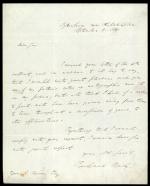
Richard Rush, son of Dickinson College Founder Benjamin Rush, responds to a letter from George H. Moore.

Richard Rush writes Colonel Thomas Aspinwall to discuss the publication of the English edition of his book, Memoirs of a Residence at the Court of London, which contains "important additions and corrections" that were missing from the Phi
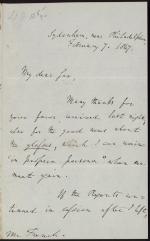
Richard Rush, United States Minister to France, thanks Benjamin B. French for finding his glasses and discusses the recent meeting of the Regents of the Smithsonian Institution.

Richard Rush, United States Minister to France, asks Benjamin B. French when the Regents of the Smithsonian Institution adjourned and if French has heard about a pair of spectacles Rush lost.
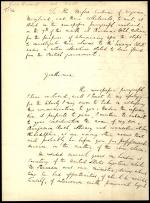
Diplomat and politician Richard Rush writes to "the Messrs. Corbin of Virginia, Maryland, and their collaterals" to meet and investigate their claims to the Jennings Estate.
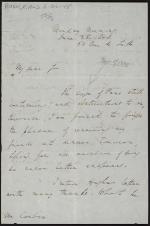
Richard Rush, United States Minister to France, informs a Mr.

Diplomat and politician Richard Rush writes to Colonel Thomas Aspinwall, discussing the upcoming publication of Aspinwall's book in Philadelphia, the possibility of publishing a second edition in London, and the reproduction of excerpts in Philade


Benjamin Rush III, grandson of Dickinson College founder Benjamin Rush, writes to attorney Jervis Spencer regarding debt of Joseph Newcomer. Transcript included.

The collection includes bills, receipts, letters, and account books of Josiah Albertson's lime and lumber business in Plymouth, Montgomery County, Pennsylvania, which he later held in partnership with his brothers, Jacob and Benjamin. Also included are papers relating to the Plymouth Railroad Company (1831-1844), the Gwynyd Friends Meeting, and family correspondence.

Alexander Biddle, the patriarch of the collection, was born on April 29, 1819 in Philadelphia, Pennsylvania, the son of Thomas A. Biddle and Christine Williams Biddle. A member of a prominent and wealthy Philadelphia family, he graduated from the University of Pennsylvania in 1838 and became a successful lawyer—a profession that ran in his family and would continue in later generations. He married Julia Williams Rush in 1855—the granddaughter of Founding Father Benjamin Rush—which allows for both the Williams and Rush families to be well represented in this collection. It is Alexander, his wife Julia, and his seven children—Alexander, Henry, Julia, Wilmer, Louis, Marion, and Lynford, that make up a majority of this collection.
The Biddle Family Collection is housed in 11 document boxes. This collection consists primarily of correspondence between both friends and members of the Biddle Family as well as business associates. The collection is centered around Alexander Biddle (April 29, 1819—May 2, 1899), starting with him and progressing into an emphasis on his wife and children (Alexander, Henry, Julia, Wilmer, Louis, Marion, and Lynford) as well as other family members. The Rush family, via Alexander marrying into it, is also well represented.
These materials are arranged into the following 9 categories: Correspondence, Financial Materials, Legal Materials, Clubs/Societies, Invitations, Animal Business, Ephemera, Miscellaneous, and Photographs. This collection was generously donated by Samuel and Anna D. Moyerman.

The collection consists mainly of personal correspondence: fifty letters, most of which are from Carolyn Elizabeth Roberts Ayer to her husband Joseph Cullen Ayer (b. 1839) at various points in his life, beginning before their marriage (1861) when he was at Harvard; as a medical officer in the 18th Massachusetts Volunteers (1861-63); as a land speculator in Tennessee; and as a businessman in Boston. The collection also includes other family correspondence and legal materials, the latter comprised of family deeds and the settlement of Ayer's father's (Joseph Cullen Ayer, Sr. - 1846) and his mother's (Rachael Ellis Ayer-Washburn - c. 1888) estates. Miscellaneous materials include poetry and a medical thesis by Joseph Cullen Ayer, Sr.; printed materials contain three Civil War manuals.